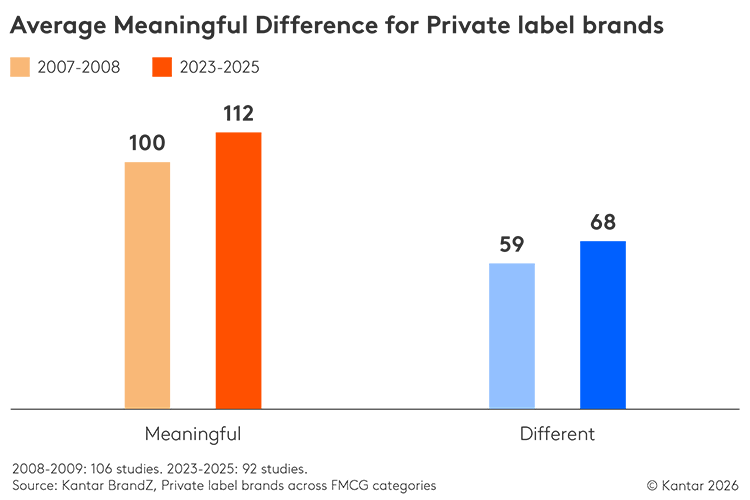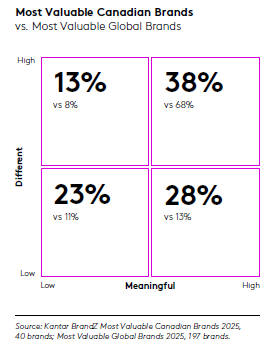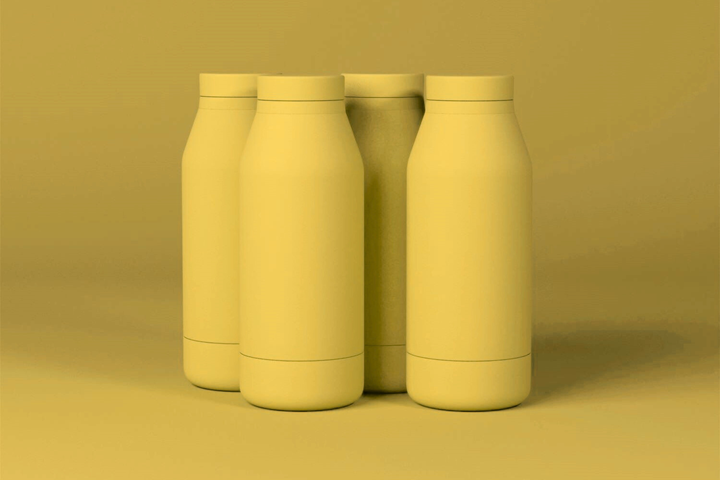Gone are the days when private label brands were chosen purely for their competitive pricing. It’s true that as consumers continue to adapt to a rising cost of living, and now as tariffs threaten further economic instability, the value provided by private labels has become increasingly appealing.
But price is no longer the only attractive feature. Retailers have evolved their private label offers to provide a quality that is very similar to branded products, whether that is through ingredient quality, packaging design, or brand identity. As a result, private labels have become more Meaningful and Different to shoppers over time.

Meaningful Difference—a Canadian lens
Every day, consumers are touched by more brands than they realize. This creates a web of intangible connections in their minds derived from what they know about the brand, what they’ve experienced from it, and what they feel about it. With decades of research into consumer perceptions of brands, Kantar has identified three essential qualities which the brands with the strongest and deepest connections with consumers have in common. These brands are Meaningful, Different, and Salient.
Meaningful brands meet the functional needs of consumers in their category, but they also connect emotionally with people.
Being Different is not just about standing out from other brands in the category but also leading category trends and innovations.
Salient brands come to consumers’ minds quickly and easily.
Retailers in Canada are not just offering a cheaper alternative through private labels; they have created brands that are Meaningfully Different in their own right. Last year saw the grocery retailer Metro refresh its private label brand, Irresistible, ensuring that it stands out more on the shelf compared to others in the category. Loblaws, meanwhile, meets a wide range of consumer needs by offering thousands of products on both ends of the price spectrum with No Name and President’s Choice.
An opportunity for Canadian brands
The key for Canadian brands to combat private label lies in the strength of their own connections with consumers. The most valuable Canadian brands have a real opportunity to build their own Meaningful Difference.

The latest Kantar BrandZ analysis proves just how important Meaningful Difference is to driving brand value. The most valuable Global brands that appeared consistently between 2006 and 2025 saw an average brand value growth of $7.2 billion. Those that started with strong Meaningfulness and Difference grew by an extra $5 billion.
Meaningful Difference is the growth driver of brand value and key for Canadian brands to combat private labels because it allows brands to justify consumer choice at their desired price point. Consumers are more likely to see a brand as worth the price it charges if it meets their needs and stands out compared to other brands. This allows brands to set the pricing agenda and continue to be chosen over cheaper private labels, wherever they operate on the price scale.
So, how does a brand build Meaningful Difference in practice? Let’s take a look at the variety of ways that some of the most valuable brands in the world have done it.
Lindt is the #1 most valuable chocolate brand in the world, supported by a strong Meaningfully Different positioning. It has leveraged its Swiss heritage to communicate its expertise, consistently building premium perceptions through the high-quality ingredients and precision that goes into making its chocolate. As a result, consumers recognize it as a specialist brand that tastes better than others.
Dove’s strength in beauty comes from its Meaningful connections with consumers. Not only does it meet their needs as a convenient brand for everyday use, but it has also built strong emotional connections with its audience through its focus on empowering women in its communications, amplifying their real-life stories to spark conversations about unrealistic beauty standards.
One of Canada’s own, lululemon, operates in a category that isn’t immune to the threats of private label. lululemon stands out as a very differentiated brand to Canadian consumers, who recognize not just its distinctive brand assets, but also its commitment to quality, style, and leadership in the trend towards athleisure. These attributes encourage consumers to think that lululemon’s more premium prices are worth paying for, though a challenge remains for the brand to stay relevant to its audience amidst a tough economic climate and a competitive category.
As the most valuable global brands have shown, there is no one-size-fits-all when it comes to what Meaningful Difference looks like. For marketers to identify a strategy for their own brands, they need to investigate what the key functional and emotional needs are in their category, identify how their brand can address these authentically, and pinpoint what makes their brand stand out versus others. Once marketers have determined an appropriate positioning for their brand and communicated it consistently across touchpoints, their brands will be better placed to fend off competition from private labels, continue to be chosen more frequently, and as a result, better weather market shocks.
View our full 2025 Kantar BrandZ Most Valuable Canadian Brands report here




